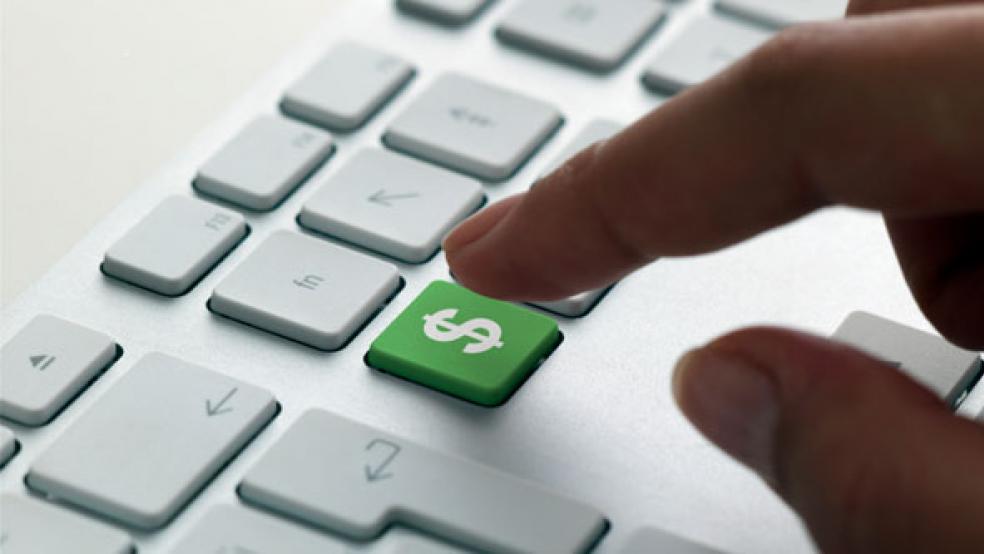The smartphone revolution – just look at the gargantuan surge in the number of iPhones that Apple sold in the fourth quarter – is finally starting to deliver on an old promise: Increasingly, those phones are doubling as our wallets.
PayPal, which is beginning to roll out in-store e-payment systems, starting with Home Depot (HD), will be one of those relying on smartphones as part of the new payment systems. In fact, if you look around, smartphone wallets – after long being heralded as the future of money – are everywhere. Get in line to board a flight, and odds are that you’ll spot someone ahead of you offering up their smartphone with an image of their boarding card to be scanned rather than your antediluvian paper boarding pass. A PayPal developers’ conference even featured the demonstration of someone using a smartphone (along with Twitter and a PayPal account) to buy a gumball from a machine.
PayPal, a division of eBay (EBAY), is a big contributor to the auction site’s growth and even the departure of PayPal’s former CEO for the top job at Yahoo isn’t likely to change the fundamentals: the fact that with every year that passes, more transactions that once were handled with cash are shifting to credit cards or other non-cash methods of exchange. Even eBay and PayPal can’t keep ahead of the curve: Last year, they forecast that mobile payments would reach $1.5 billion; even after doubling that estimate, they still fell short of the actual total reported last week: $4 billion. They now are calling for that figure to hit $7 billion this year.
The shift to a cashless society is the focus of an upcoming book by Wired contributing editor David Wolman, The End of Money. Due out from da Capo Press (in both real and electronic versions) on February 14, the book is a love letter of sorts to PayPal and other disruptive technologies that Wolman believes will soon force the literal greenback (not to mention the dime and the penny) out of circulation. That day can’t come too soon for the author, an unabashed admirer of e-payments for their efficiency and ease of use. (He’s also a bit of a germaphobe, worried about where those dollar bills have been and what they might have picked up along the way....)
Wolman’s book is an entertaining and engaging canter through the world of money, both real and electronic, but it does prod a reader into pondering who will emerge as winners and losers if the book’s central thesis proves correct and we do shift more rapidly than anticipated to a world dominated by cyber-cash. The last few days have shown that those winners are already benefitting, eBay and Apple amongst them. (Smartphone technology is proving key to seamless e-payment programs.)
Facebook is another contender. Facebook credits can be used to pay for all kinds of intriguing items, including gold on games developed by Zynga (ZNGA). What happens if someone opts to be paid for an item or service in Facebook credits? And if that’s the “cash” they prefer, well, why not?
Other companies are also benefitting. MasterCard’s (MA) stock was one of last year’s winners, surging as more cardholders steered more transactions online. And the credit card company has been investing in new e-payment systems, such as its PayPass technology, which works on the Android Wallet app developed by Google (GOOG). Banks may also benefit, especially to the extent they are able to levy fees on the use of debit cards and particularly in the near term as “cashless” remains most closely linked to conventional payment methods such as credit and debit cards.
Going forward, keep an eye open for companies developing technologies that will keep all that cyber-cash secure as it flows through the air. Most of us have felt the pain and inconvenience of having a credit card hacked and getting a call inquiring as to whether we have just spent $1,800 on a new entertainment system on Walmart.com. Pushing more transactions online raises the potential for more of this kind of fraud, and snafus of all kinds. (One bank-to-bank transfer of my own recently vanished into cyberspace....)
Whether or not the transformation occurs as rapidly and completely as Wolman forecasts and hopes for, big companies are scanning the landscape looking for ways to position themselves for the change today.



